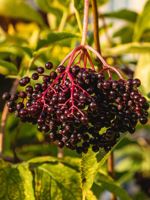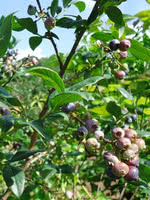Mon-Fri 9am - 5pm Mountain time
Blue Crop Blueberry vs Bob Gordon Elderberry
Sambucus canadensis Bob Gordon
Vaccinium corymbosum Blue Crop
Bob Gordon Elderberry is a Black Elderberry cultivar that produces berries that are larger and sweeter than other varieties, making it one of the top cultivars. It produces large clusters of white flowers that turn into large clusters of dark purple to black berries. The berries are well-suited for baked goods, jams, jellies, and syrups. It was selected from the wild in Missouri.
The large berry clusters that the Bob Gordon Elderberry produces will often end up hanging downward. This makes it more difficult for birds to feed on the berries. If birds are a concern, this might be the right berry for you.
Black Elderberries are considered to be partially self-pollinating. So while they will still produce some berries without cross-pollination, planting with another variety will increase yields. Consider planting with Black Elderberry or Ranch Elderberry.
Warning: the seeds, stems, leaves, roots, and uncooked berries are toxic to humans when eaten in quantity. Berries should be cooked to make them safe for human consumption.
Blue Crop Blueberry is a high yielding, commercial highbush blueberry variety that is widely planted. If you're lucky enough to live in a suitable climate zone, Blue Crop Blueberry is a great choice. Its very large berries taste amazing. They are very firm and store well.
While this variety is self-pollinating, we recommend pairing Blue Crop Blueberry with another Blueberry to increase the berry production of both varieties.
You must prune Blue Crop Blueberry to maintain its health and productivity.
Note: Blueberries require very specific soil conditions. They need well-drained soil with a pH between 4.5 and 5.0.
Bob Gordon Elderberry Quick Facts
Blue Crop Blueberry Quick Facts
Toxicity: leaves, stems, and uncooked berries are poisonous to humans

